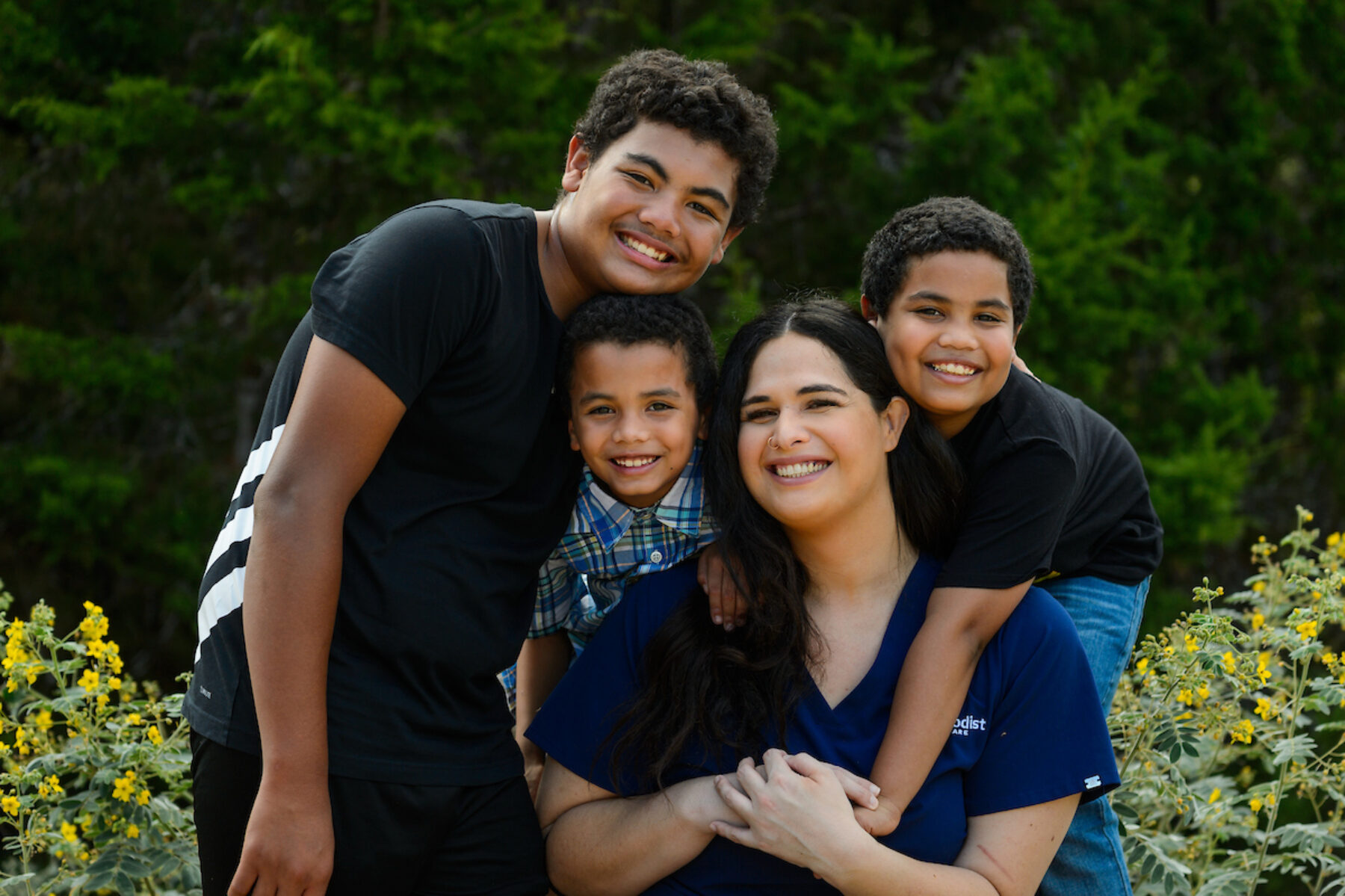For Chelsie Perreira, the enormity of what she had accomplished did not sink at graduation, nor at her pinning ceremony, which COVID-19 had rendered digital anyway. For her, it was on her first day at work at San Antonio Methodist Hospital when she picked up her badge and saw it there in black and white right next to her picture: “Chelsie Perreira, RN.”
“I worked so hard and so long just for those two little letters next to my name,” she said, laughing.
She can laugh now, but the road that led to that badge was a very hard grind. Born into poverty on the Hawaiian island of Moloka’i, the daughter of a Portuguese pineapple field laborer and a Native Hawaiian stay-at-home mother, Perreira recalls doing homework by candlelight — “Just like Abraham Lincoln,” she laughed — in her family’s cold-water, unelectrified home. She averted her eyes and went silent when her classmates talked about what they had seen on TV the night before.
Post-graduation, few were able to stay on the island, where jobs are extremely scarce . She moved to Honolulu. Her brother enlisted in the Army. Her sister became addicted to drugs, was later incarcerated, and her three sons wound up in Chelsie’s mother’s care — at first. When her mother passed away at 69 in 2016, Chelsie, now 30, stepped up. Foster care simply was not an option — Perreira did not want them in the system and wanted them to be there for her sister when she got out of prison.
Meanwhile, Perreira had become a certified nursing assistant. The $11-an-hour wage was barely enough to keep up with the rent — she and a roommate shared one bedroom in a $2,700-per-month two-bedroom Honolulu apartment. After her mother died, Chelsie and her nephews followed her brother to San Antonio, where at least there was opportunity, even if it at first seemed hopelessly out of reach. But one day a workmate told her about Project QUEST, a job training program that aims to bring the American Dream back into reach like few others.
Clear and Compelling Evidence
Two years ago, Paul Osterman, professor at the M.I.T. Sloan School of Management, told the New York Times in its profile of Project QUEST, that if you threw a dart at “a list of all the efforts that claim to be job training programs…whatever you hit wouldn’t match the results of Project QUEST. It is scalable, and there is no reason every city and town in America can’t have something like it.”
As a matter of fact, the San Antonio-based program is being emulated all over Texas and as far away as England, but at an estimated per-participant cost of $12,500 for the 23-month (on average) program, some see it as expensive, even though it has been rigorously shown to produce long-run benefits.
According to the recently published 11-year follow-up study, Project QUEST has demonstrated itself as America’s only workforce training program with clear and compelling evidence of sizable gains in earnings for participants 10 years and more after they joined the program. In each of the ninth, 10th, and 11th years after joining the program, Project QUEST participants increased annual earnings by an average of $5,000 per year. Eighty-eight percent of participants were female; 74 percent Latino. On average, they earned only $13,000 a year in the year prior to entry.
In short, Project QUEST works. And right now, there is the potential to fund Project QUEST as never before. In September, the House Democrats included $9 billion for the Retention and Completion Fund as part of the Build Back Better Act: much-needed cash for evidence-based programs with proven track records in facilitating completion rates at colleges and universities that serve high numbers of low-income students.
In other words, programs like Project QUEST.
“This could dramatically accelerate Project QUEST’s impact,” said Kelly McManus, director of higher education at Arnold Ventures. “Project QUEST is exactly the type of program that we should be investing in, and we are excited that Congress and the President agree.”
Project QUEST’s commitment to participants sees them through college, not just to college. “This focus on graduation and success is a paradigm shift that can be as transformational today as the GI Bill and Pell Grants have been for improving access to college,” said McManus.
McManus sees this as a once – in-a-generation opportunity to invest in what works for students, especially students of color and students from low-income backgrounds who have so often been underserved.
Project QUEST is exactly the type of program that we should be investing in, and we are excited that Congress and the President agree.Kelly McManus director of higher education at Arnold Ventures
Now in its 30th year, Project QUEST arose in the economic reorganization that followed NAFTA. Over a few short years, San Antonio lost 14,000 manufacturing jobs — many at a shuttered Levi’s jeans plant — and gained 19,000 service and tech job opportunities. Many of these jobs paid very well, but at the time, the region was suffering from an acute skills mismatch.
Project QUEST aims to develop the skills needed where the jobs are at any given time — and since those are almost always at the other end of a training or certification program or college degree, much of their work is devoted to helping low-income students navigate higher education so they may attain those credentials. They offer financial assistance — not just for tuition and books, but also for transportation and the various fees associated with certification programs. Some students need remedial math and reading courses. There are weekly meetings on life skills such as how to dress for success, study skills, developing critical thinking, and conflict resolution. For financial needs beyond the program’s purview — child care, utilities, and food — they offer referrals and direct financial assistance on an as-needed basis. And finally, at the end of the journey, they offer resume and interview tips and other job placement strategies.
A Boom in Nursing
Right now, at or near the top of the opportunity list is nursing. Given that the prospect of growth in the industry has long been projected due to the aging Baby Boom generation, add in the Black Swan of COVID-19, and demand has skyrocketed beyond even those sobering forecasts.
According to the Bureau of Labor Statistics, 176,000 job openings for nurses open up each year. That was in 2019, prior to the pandemic. An August 2021 New York Times article highlights a troubling trend: Just as approximately 640,000 of the nation’s nurses are nearing retirement age, they, along with all the rest of the Baby Boom generation, are requiring more and more medical care.
Add to that the pandemic, which is increasing burnout among nurses of all ages — not only are older nurses naturally cycling out, younger ones, brutalized by the grind of working short-staffed in these unprecedented times, are looking for jobs in other industries.
Programs like Project QUEST offer a partial solution. The program’s counselors become advocates for their “QUESTers,” tapping into a homegrown demographic that might otherwise have limited opportunity.

About halfway through her time in the program, Perreira was about to give up. She found one of her nursing professors so cold and callous, all of her hard work — a 5 a.m. alarm clock; getting one nephew to pre‑K, the second to kindergarten, and the third to grade school; working as a school secretary until the 3 p.m. bell; rounding up the kids; cooking them dinner and then getting them to bed, all that before she could hit the books — would be for naught because of this one teacher with whom she didn’t mesh.
“I knew my work was my own responsibility, but…,” her voice trailed off before picking back up when she mentions Maria Salazar, veteran career coach with Project QUEST.
Over her 27 years with the program, Salazar has heard it all. Not too uncommonly, QUESTers live in their cars, for example. Others who live in shelters have to get permission slips from Salazar to attend certain evening events.
During mandatory weekly meetings with Salazar — check-ups on grades and attendance and much more — Perreira also had the chance to vent about her self-doubts. “I would just be so stressed with class stuff, with work stuff, and she would get me back in focus. She would tell me, you are not the first person to be here and you won’t be the last.”
“I always tell students ‘What you tell me is not going to freak me out, because I’ve been there, done that,” said Salazar. “I’ve been with [QUESTers] through their weakest moments and, of course, through all their glory.”
Salazar herself grew up in San Antonio’s proud but impoverished West Side. She believes her upbringing helps her relate. “It’s my passion. I believe I get it from the community, from the students, because I want them to succeed, I want them to make the money they are worth, and so it’s important to me to make sure that they complete their schooling and the training that they need.”
“What I like about working with Maria is that she knows and advocates Project QUEST’s goals,” said Stella Cirlos, director of nursing education at the Alamo Colleges, a Project QUEST partner. “She’s very adamant in trying to help the student achieve their educational goals so they can get into careers and be independent.”
Once over that hump, Perreira found nothing but good times ahead. One day she realized that, theoretically, she was doing so well in her final class, even failing her last two exams couldn’t stop her.
She didn’t, for the record, and weeks later she became the first in her family to graduate college. Her days in cramped apartments on partial public assistance are now long behind her. Less than a year into her career, she is making the sort of future plans she dared not even dream of three years ago.
“Being a nurse is tough, especially now with COVID on the rise again,” she said. Nevertheless, she is pressing ahead. For the first time, home ownership is a realistic goal — though she has yet to commit to a full-time search, she plans one in the near future, perhaps on the one-year anniversary of the date she acquired those two little letters she can now affix to her name.
“Now I make a livable wage and can provide for myself and my family,” she said. “I also hope that I can inspire my nephews to never give up on their goals. It takes hard work but it is not impossible.”













